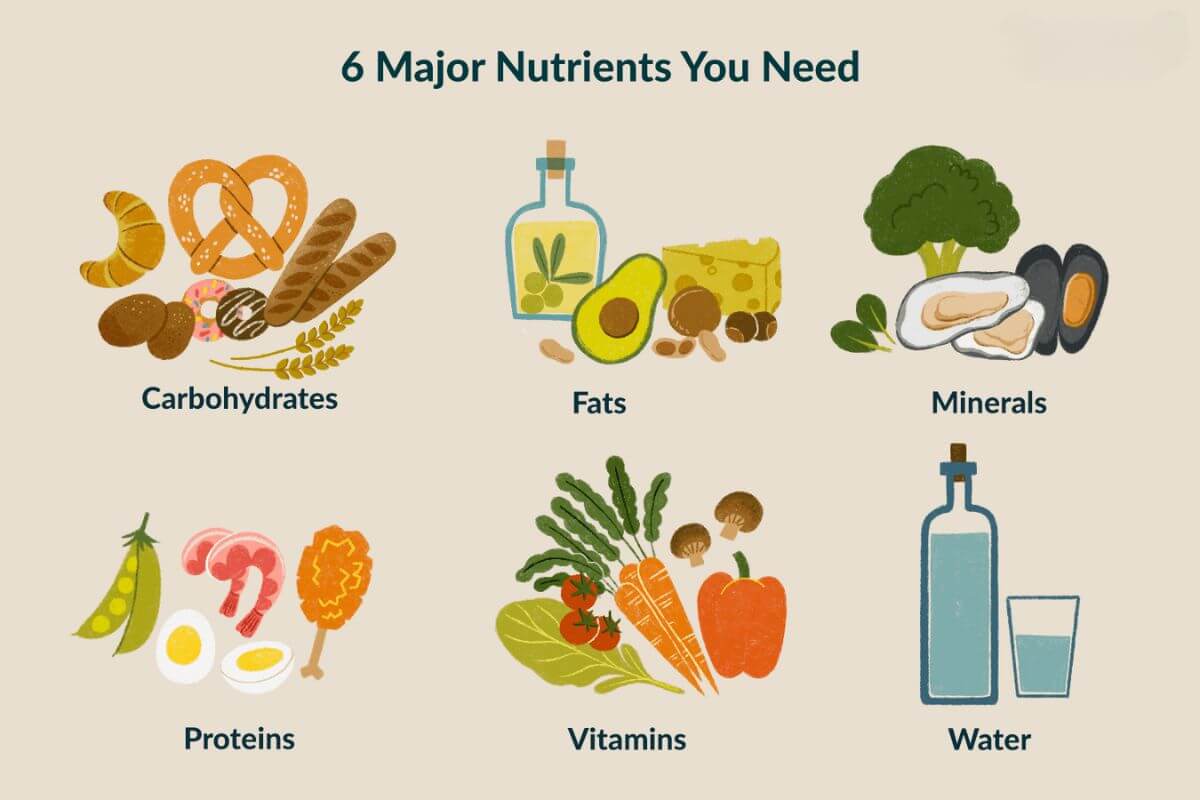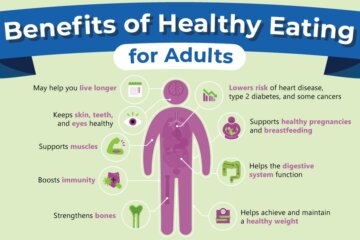The human body needs various nutrients for good health. But how many exactly?
The answer is not as simple as you might think. Our bodies require a mix of essential nutrients to function properly. Nutrients include vitamins, minerals, proteins, fats, and carbohydrates. Each plays a crucial role in keeping us healthy. Without the right balance, we can face health issues.
It’s important to understand which nutrients we need and why they matter. This blog will explore the key nutrients needed for good health and how they support our well-being. Stay with us to learn how to nourish your body effectively.

Credit: www.healthdirect.gov.au
Macronutrients
Macronutrients are essential for the human body to function well. They provide energy, build and repair tissues, and regulate bodily processes. The three main macronutrients are carbohydrates, proteins, and fats. Each plays a unique role in maintaining good health.
Carbohydrates are the body’s primary energy source. They are found in foods like bread, rice, fruits, and vegetables. Carbs break down into glucose, which fuels your brain and muscles. Simple carbs provide quick energy. Complex carbs offer sustained energy and fiber. Both are important for balanced nutrition.
Proteins are vital for building and repairing tissues. They are made up of amino acids, which are the building blocks of life. You can find proteins in meats, beans, nuts, and dairy products. They support muscle growth and immune function. Eating enough protein is key for maintaining strength and vitality.
Fats are essential for storing energy and protecting organs. They also help absorb vitamins and produce hormones. Healthy fats are found in avocados, nuts, and olive oil. Saturated and trans fats should be limited. Fats are calorie-dense, so moderation is key. Healthy fats contribute to brain health and overall well-being.

Credit: dietitiansondemand.com
Micronutrients
Micronutrients are essential for the body, though needed in small amounts. They play a key role in various functions. Without them, the body cannot perform at its best. Let’s explore two main types: vitamins and minerals.
Vitamins are organic compounds vital for health. Each vitamin has a unique role. For example, Vitamin A supports vision and immune function. Vitamin C helps with healing and iron absorption. B vitamins aid in energy production and brain function. Vitamin D maintains bone health by helping calcium absorption. A balanced diet usually provides all the vitamins needed.
Minerals are inorganic elements also crucial for the body. Calcium is necessary for strong bones and teeth. Iron is key for making red blood cells. Magnesium supports muscle and nerve function. Potassium helps regulate fluid balance and heart function. Each mineral contributes to overall health. It’s important to get enough through diet and sometimes supplements.
Water
Water is essential for life. It makes up a significant part of our body. Every cell, tissue, and organ needs water to function. Staying hydrated is vital for maintaining good health. Let’s delve into the importance of water for our bodies.
Hydration Importance
Our bodies rely on water for many processes. It helps regulate body temperature. Water aids in digestion and nutrient absorption. It also keeps joints lubricated. Staying hydrated ensures that the body can perform these functions properly.
Dehydration can lead to various health issues. These include headaches, fatigue, and even kidney problems. Drinking enough water helps prevent these conditions. It also promotes overall well-being.
Daily Intake Recommendations
The amount of water you need depends on several factors. These include age, weight, and activity level. Generally, adults should aim for 8 cups of water a day. This is about 2 liters or half a gallon.
Remember, other beverages count too. Tea, coffee, and even some foods contribute to your daily water intake. Fruits and vegetables like cucumbers and watermelons are high in water content. Staying aware of your hydration levels is crucial.
Carbohydrates
Carbohydrates are one of the essential nutrients our body needs. They are the body’s main source of energy. Carbohydrates can be found in fruits, vegetables, grains, and dairy products. Understanding the role of carbohydrates in our diet is crucial for maintaining good health.
Energy Source
Carbohydrates provide the fuel our body needs to function. They are broken down into glucose, which is used for energy by our cells, tissues, and organs. This is especially important for brain function, muscle activity, and digestion.
Without adequate carbohydrates, our body will struggle to perform these vital functions. This can lead to fatigue, poor concentration, and reduced physical performance.
Types Of Carbs
Not all carbohydrates are created equal. There are two main types:
- Simple carbohydrates: These are sugars found in fruits, milk, and sweeteners like honey. They provide quick energy but can lead to blood sugar spikes.
- Complex carbohydrates: Found in whole grains, vegetables, and legumes. They provide sustained energy and are rich in fiber, which aids in digestion.
Complex carbohydrates are generally the healthier choice. They take longer to digest, providing a steady release of energy. Fiber in complex carbs also helps to keep you full longer and supports gut health.
Here is a table summarizing the differences:
| Type of Carbohydrate | Sources | Benefits |
|---|---|---|
| Simple Carbohydrates | Fruits, milk, honey | Quick energy |
| Complex Carbohydrates | Whole grains, vegetables, legumes | Sustained energy, rich in fiber |
Incorporating a balance of both types of carbohydrates can help maintain energy levels and overall health. It is important to focus on consuming more complex carbohydrates for their additional health benefits.
Proteins
Proteins are essential nutrients needed for various bodily functions. They play a crucial role in muscle development, tissue repair, and the production of enzymes and hormones. Understanding the importance of proteins and their sources can help maintain good health.
Muscle Building
Proteins are vital for muscle building. They provide the amino acids necessary for repairing and growing muscle tissues after exercise. This is especially important for athletes and individuals who engage in regular physical activity. Consuming the right amount of protein can enhance muscle recovery and growth.
Protein Sources
There are numerous sources of protein that can be included in a balanced diet. These sources can be categorized into animal-based and plant-based proteins.
| Animal-Based Proteins | Plant-Based Proteins |
|---|---|
| Chicken | Beans |
| Fish | Lentils |
| Eggs | Tofu |
| Beef | Quinoa |
| Milk | Nuts |
Including a variety of these protein sources in your diet ensures you get a wide range of amino acids. This variety helps in maintaining overall health and supports different bodily functions.
- Chicken: A lean source of protein.
- Fish: Rich in omega-3 fatty acids.
- Eggs: Complete protein with all essential amino acids.
- Beans: High in fiber and protein.
- Quinoa: A complete protein source among plant-based options.
Incorporating these protein sources in your daily meals can help meet your protein needs. Aim for a balanced diet with a mix of animal and plant-based proteins for optimal health benefits.
Fats
Fats are essential nutrients for the human body. They provide energy, support cell growth, and protect organs. Fats also help the body absorb some vitamins and produce important hormones. But not all fats are created equal. It’s important to know the difference between healthy and unhealthy fats.
Healthy Fats
Healthy fats, or unsaturated fats, are good for your heart. They can lower bad cholesterol levels. Sources of healthy fats include olive oil, avocados, nuts, and fish. Omega-3 and omega-6 fatty acids are examples of healthy fats. These fats support brain health and reduce inflammation.
Including healthy fats in your diet can improve overall health. Cook with olive oil instead of butter. Snack on a handful of nuts. Add avocado to your salads. Eating fish like salmon or mackerel twice a week is beneficial.
Unhealthy Fats
Unhealthy fats, or saturated and trans fats, can harm your health. They raise bad cholesterol levels and increase the risk of heart disease. Common sources of unhealthy fats include fried foods, baked goods, and processed snacks. Red meat and full-fat dairy products also contain high amounts of saturated fats.
Limiting the intake of unhealthy fats is important for good health. Choose lean meats, low-fat dairy products, and avoid fried foods. Read food labels to check for trans fats. Avoid foods with partially hydrogenated oils. Making these changes can lead to better heart health and overall well-being.
Vitamins
Vitamins are essential nutrients that the human body needs to function properly. They support vital processes like metabolism, immunity, and cell function. Without enough vitamins, our health can suffer. There are two main types of vitamins: fat-soluble and water-soluble.
Fat-soluble Vitamins
Fat-soluble vitamins dissolve in fats and oils. They are stored in the body’s fatty tissues and liver. The body can use these vitamins when needed, reducing the need for daily intake. The four fat-soluble vitamins are A, D, E, and K. Each has unique benefits.
Vitamin A supports vision, immune function, and skin health. Vitamin D helps with calcium absorption, bone health, and immune function. Vitamin E acts as an antioxidant, protecting cells from damage. Vitamin K plays a crucial role in blood clotting and bone health.
Water-soluble Vitamins
Water-soluble vitamins dissolve in water. The body cannot store them, so they must be consumed regularly. These vitamins are easily lost through urine. The main water-soluble vitamins are the B vitamins and vitamin C.
The B vitamins include B1 (thiamine), B2 (riboflavin), B3 (niacin), B5 (pantothenic acid), B6 (pyridoxine), B7 (biotin), B9 (folate), and B12 (cobalamin). They help convert food into energy and support brain function. Vitamin C is important for skin, bones, and blood vessels. It also boosts the immune system and helps absorb iron from plant-based foods.
Minerals
Minerals are essential nutrients the body needs to function properly. They play a key role in building bones, making hormones, and regulating your heartbeat. The human body requires different types of minerals, classified as major and trace minerals, to maintain optimal health.
Major Minerals
Major minerals are those that the body needs in larger amounts. They include:
- Calcium: Needed for strong bones and teeth. Also helps muscles and nerves function.
- Phosphorus: Works with calcium to build bones and teeth. Also involved in energy production.
- Potassium: Helps regulate fluid balance, muscle contractions, and nerve signals.
- Sodium: Essential for maintaining fluid balance and nerve function.
- Magnesium: Supports muscle and nerve function. Also aids in energy production.
- Chloride: Helps maintain fluid balance and is part of stomach acid.
- Sulfur: Important for protein synthesis and enzyme function.
Trace Minerals
Trace minerals are needed in smaller amounts but are equally important. They include:
- Iron: Crucial for making hemoglobin, which carries oxygen in the blood.
- Zinc: Supports immune function, wound healing, and DNA synthesis.
- Manganese: Involved in bone formation and metabolism of amino acids, cholesterol, and carbohydrates.
- Copper: Needed for iron metabolism and red blood cell formation.
- Selenium: Important for reproduction, thyroid gland function, and DNA production.
- Iodine: Essential for making thyroid hormones, which regulate metabolism.
- Fluoride: Helps strengthen teeth and prevent cavities.
Both major and trace minerals are vital for good health. Including a variety of foods in your diet can help ensure you get enough of these important nutrients.
Balanced Diet
A balanced diet is crucial for maintaining good health. It provides the body with the essential nutrients it needs. These nutrients include vitamins, minerals, proteins, fats, and carbohydrates. A well-balanced diet ensures that all these nutrients are consumed in appropriate amounts.
Meal Planning
Meal planning helps in organizing meals to include a variety of foods. This variety ensures a balanced intake of nutrients. Planning meals ahead of time can prevent poor food choices. It also helps in managing portion sizes. Including different food groups in every meal is essential.
Nutrient-rich Foods
Nutrient-rich foods are vital for a balanced diet. These foods include fruits, vegetables, whole grains, lean proteins, and healthy fats. Fruits and vegetables provide essential vitamins and minerals. Whole grains offer fiber and energy. Lean proteins are important for muscle repair and growth. Healthy fats support brain function and overall health.
Incorporating these nutrient-rich foods into daily meals can improve overall health. It ensures that the body gets all the required nutrients. Eating a variety of these foods can make meals more enjoyable and nutritious.

Credit: www.britannica.com
Nutrient Deficiency
Nutrient deficiency occurs when the body lacks essential vitamins and minerals. These nutrients are vital for various bodily functions. Deficiencies can lead to several health issues. Understanding common deficiencies and their impacts can help in maintaining good health.
Common Deficiencies
Iron deficiency is widespread. It can cause fatigue and weakness. People often lack enough vitamin D. This can lead to bone problems. Another common deficiency is vitamin B12. It is crucial for nerve function. Magnesium deficiency is also common. It affects muscle and nerve function. Lack of calcium can weaken bones. It is essential for children and elderly.
Health Impacts
Iron deficiency can lead to anemia. This results in tiredness and pale skin. Vitamin D deficiency may cause rickets in children. In adults, it can lead to osteoporosis. Low vitamin B12 levels can cause nerve damage. This may result in memory loss and mood changes. Magnesium deficiency can cause muscle cramps. It may also lead to irregular heartbeat. Calcium deficiency weakens bones. This increases the risk of fractures. Proper intake of these nutrients is crucial for health.
Frequently Asked Questions
How Many Essential Nutrients Does The Body Need?
The human body needs six essential nutrients: carbohydrates, proteins, fats, vitamins, minerals, and water. These nutrients are crucial for overall health and well-being.
What Are The Primary Macronutrients?
The primary macronutrients are carbohydrates, proteins, and fats. They provide the body with energy and are vital for growth and repair.
Why Are Vitamins Important For Health?
Vitamins are essential for various bodily functions, including metabolism, immunity, and cell repair. They help maintain overall health and prevent deficiencies.
How Do Minerals Benefit The Body?
Minerals support bone health, muscle function, and nerve transmission. They also play a role in maintaining heart health and enzyme functions.
Conclusion
Understanding the nutrients your body needs is crucial for good health. Vitamins, minerals, proteins, fats, and carbohydrates all play vital roles. Each nutrient supports different bodily functions. A balanced diet ensures you get these essential nutrients. Aim for variety in your meals.
Fruits, vegetables, grains, and proteins should be part of your daily intake. Stay hydrated and maintain a healthy lifestyle. Regular check-ups can help monitor your nutrient levels. A nutrient-rich diet leads to better overall well-being. Make informed choices and prioritize your health.
Remember, good nutrition is key to a healthy life.

“As the voice behind Radiant Glow Health, we are dedicated to being your ultimate wellness and vitality companion. Our mission is to inspire and guide you on your journey to a healthier and more vibrant life. Join us as we explore holistic health practices and empower you to radiate wellness from within.”



